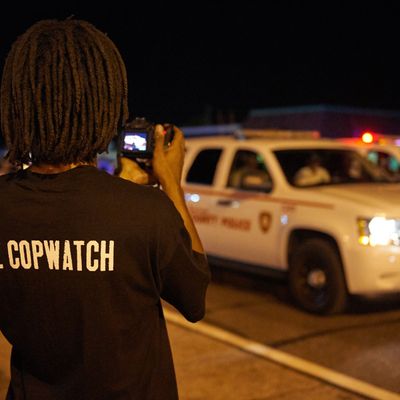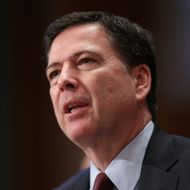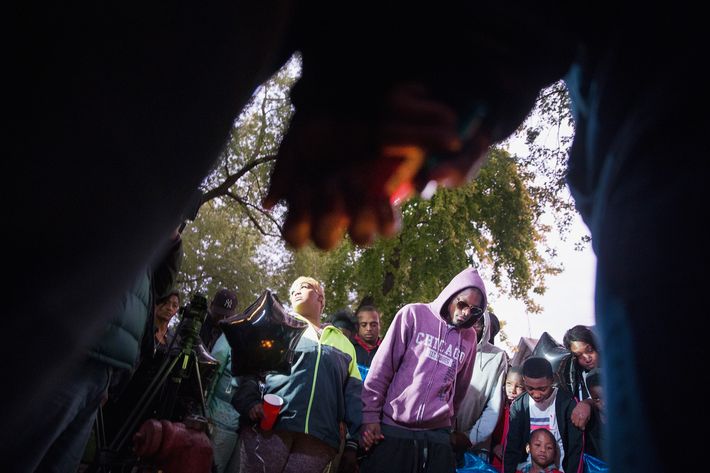
Speaking about race and crime at a University of Chicago Law School event on Friday, FBI Director James Comey attempted to link the rise in violent crime across various U.S. cities to the increased overall scrutiny of police conduct in this “age of viral videos” — a dynamic which he believes has left police officers unwilling to do their jobs properly. “In today’s YouTube world, are officers reluctant to get out of their cars and do the work that controls violent crime?” Comey wondered, noting that cops across the country have told him they felt “under siege” and were afraid of risking their careers to the scrutiny of cell phone cameras.
Expressing his desire to bridge the widening gap between communities of color and law enforcement, and acknowledging how much of the public scrutiny of police has led to needed changes, Comey also insisted that the increased focus on police officers was also probably making violent crime worse. “I don’t know whether this explains it entirely, but I do have a strong sense that some part of the explanation is a chill wind that has blown through American law enforcement over the last year and that wind is surely changing behavior,” as well as leading to missed opportunities when it comes to confronting potential criminals. “Our officers are answering 911 calls, but avoiding the informal contact that keeps bad guys from standing around, especially with guns,” the top law enforcement leader said. “Lives are saved when those potential killers are confronted by a police officer, a strong police presence and actual, honest-to-goodness, up-close ‘What are you guys doing on this corner at one o’clock in the morning’ policing. We need to be careful it doesn’t drift away from us in the age of viral videos, or there will be profound consequences,” he warned.

The FBI director offered only no hard evidence in making his case, and while he admitted that there were other potential explanations for the increases in violent crime, he said be believed that officers’ fear of being recorded and scrutinized was the most likely cause, making Comey the highest-profile law enforcement official in the country to propose that connection. In addition, Comey expressed his concern that as a result of police disengagement, more people of color are now dying than before, and not at the hands of police. Said Comey, “I imagine two lines: One line is law enforcement, the other line is the communities that we serve and protect, especially communities of color. What I see is those two lines arcing away from each other, at an increasing rate.”
The New York Times notes that unnamed officials at the Justice Department, when informed of Comey’s remarks, “fumed” and indicated they did not share his views. The Times also points to crime statistics from Oakland, Washington, and Seattle that don’t paint a conclusive picture when it comes to supporting Comey’s views, and indeed there does not seem to be any data-based evidence of a causal link between the rise in violent crime to some kind of pullback from police officers, or that such a pullback is even happening, and if it is, that it’s a result of the increased scrutiny faced by police. So far the explanation provided by law enforcement members and commentators for any “Ferguson effect” or “YouTube effect” has been mostly anecdote and speculation, and critics of the theory like The Atlantic’s Ta-Nehisi Coates have called it an “utterly baseless suggestion that those who protested against Ferguson may well have blood on their hands.” In addition, some of the rising violence in cities across the country actually predates the protests in Ferguson.
Nonetheless, the topic was widely discussed earlier this month at a private meeting of law-enforcement officials and politicians convened by U.S. attorney general Loretta Lynch. A Washington Post journalist attended the event and noted that for many present, the change in police officer behavior and its connections to scrutiny and increased violent crime seemed to be an accepted fact. Said Chicago mayor Rahm Emanuel at the meeting, “We have allowed our police department to get fetal and it is having a direct consequence. They have pulled back from the ability to interdict … they don’t want to be a news story themselves, they don’t want their career ended early, and it’s having an impact.” Looking at the Post report, the meeting touched on, and perhaps prompted, the same concerns that Comey cited on Friday:
There is no evidence of a broad retraction of police engagement with the public in major cities, and no participant in Wednesday’s summit presented a single example of lackluster policing that somehow contributed to a violent crime. Rather, chiefs and elected officials spoke broadly of a changed atmosphere in major city police departments over the past year amid high-profile police-involved shootings and in-custody deaths that led to riots in Ferguson, Missouri, and Baltimore.
Chiefs said patrol officers still do their jobs, clocking in and policing their beats. But fewer take extra steps such as confronting a group loitering on a sidewalk late at night that might glean intelligence or lead to arrests, for fear that any altercations that ensued would be uploaded to the Internet.
Also in attendance at that earlier meeting, Director Comey spoke then of his frustration that no data yet existed to properly understand the simultaneous rise of violent crime in cities across the nation, as well as data regarding shootings involving the police, a need he revisited on Friday. Regardless, data or not, Comey now seems at least partially convinced.

Finally — complicating things even further — last month in the Baltimore Sun, Criminology professors Tracy Sohoni and Charis Kubrin argued that if there is some kind of Ferguson/YouTube effect to worry about, it’s not a matter of anxious and discouraged officers not doing their jobs, but how all of the now publicized officer misconduct may be counteracting the legitimacy of the police as an institution, a development which could also lead to a spike in crime:
According to studies, when people have trust and confidence in the criminal justice system, they are more likely to act in accordance with the law. When citizens question whether police and other criminal justice officials act in a fair and impartial manner, when they fear that interactions with the police will result in unwarranted levels of bodily harm, and when they doubt that police will thoroughly investigate questionable actions by fellow officers, legal cynicism, in which people perceive the law as illegitimate, unresponsive, and ill equipped to ensure public safety, is likely to result.
When individuals lose trust in the police they are also more likely to take matters into their own hands when conflicts arise. Studies find that retaliatory violence is more common in impoverished neighborhoods that also suffer from tense police-community relations. Thus recent highly publicized events in Ferguson, New York City and Baltimore may pose a “legitimacy challenge” to the criminal justice system, creating a legitimacy deficit that increases legal cynicism and encourages individuals to take the law into their own hands.






























